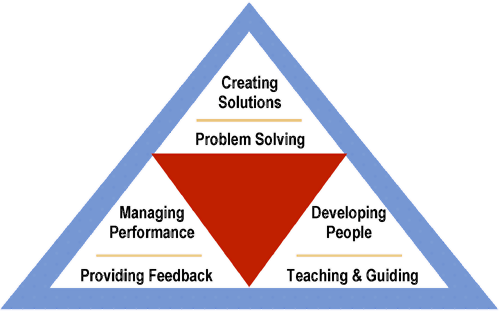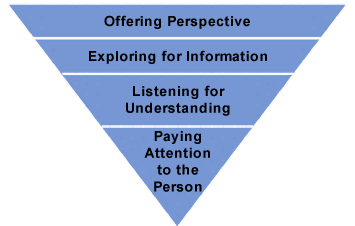Coaching for Performance Improvement™*
A Process Model©

Foundation Skills

Why Coaching Skills?
Today, empowerment is no longer just desirable – it has become an essential tool for managing. Increasing demands on scarcer resources means that a manager must rely more on their employees to make decisions. In turn, employees need to take more responsibility for their own professional development to ensure that they have the necessary skills.
This shift means two things to managers in terms of how they must learn to manage: they need to make the most of the limited amount of time they have available to their employees for development and coaching; performance management needs to become an ongoing practice – not just a once-a-year Human Resource process. It comes as no surprise that when we ask managers what one aspect they dread most about their jobs, the answer that invariably comes back is "confronting people about poor performance".
Performance Management means Effective Coaching
Many organizations have implemented processes to address this need. 360 Degree Competency Assessment and Upward Appraisal systems are just two examples. These processes can fall apart when a manager does not know how to take a developmental stance with an employee, encouraging and effectively supporting them to take responsibility for their own development.
It is precisely this experience that has highlighted the critical skill that is lacking in many organizations – the ability of managers to give constructive performance feedback to employees in a productive and ongoing manner. These are among the most important skills of an effective coach, and, once a year at review time is simply not enough.
Effective Leadership means Effective Coaching
Helping Employees Reach Higher Levels of Performance
This is the ultimate goal of any coaching interaction or process, and the skills that this course delivers.
The key objectives of the Coaching Skills course are to:
- Define coaching as a management behavior and learn the skills associated with effective coaching;
- Understand how coaching can contribute to employee development and can lead to sustained high peformance;
- Learn a process model for coaching and demonstrate the skills involved in the process;
- Develop coaching skills through the use of videotaped practice sessions using situations from your own experience;
- Learn how to apply coaching skills as an effective method for handling performance problems.
How We Do It
The coaching skills course uses a highly interactive, practice-based approach. The emphasis is on skill development rather than merely teaching theories and concepts. The primary method of learning is through practice and feedback from trained observers and peers. In the program participants will:
Define the essential Foundation Skills of a highly effective coach:
- Offering Perspective;
- Exploring for Information;
- Listening for Understanding;
- Paying Attention to the Person.
Distinguish the three primary roles of a coach:
- Creating Solutions - the coach as problem solver;
- Managing Performance - the coach as feedback giver;
- Developing People - the coach as teacher and guide.
Practice using these skills to address real-time performance management issues.
Give and receive feedback on skill development through the use of videotaping and trained observers.
The Only Way To Learn It – Is To Do It!
One of the keys to the success of this program is the opportunity for practice sessions in small groups. With a 4:1, student/facilitator ratio, participants are assured of getting individualized attention by observers trained in giving high impact feedback.
Participants don’t work with hypothetical situations or role-plays, they do live coaching in the classroom on real issues.
They receive feedback from peers and trained observers, on the spot, where they can learn from mistakes, implement corrections and test out alternative approaches. We will also certify internal observers for larger scale projects.
Finally, we will work with you to tailor the design of the program to integrate existing policies, procedures and forms into the course design. Courses can also be customized to address specific performance issues pertinent to your organization. For example, developing coaching skills unique to an organization going through large-scale change processes.
For further information about Potentia’s approach to developing Leadership Capability or to talk to someone about
implementing this training in your organization please contact us.
*Coaching for Performance Improvement™ is delivered in collaboration with the Charter Oak Consulting Group, Inc.
Contents Copyright 2004 Potentia Consulting

Foundation Skills










